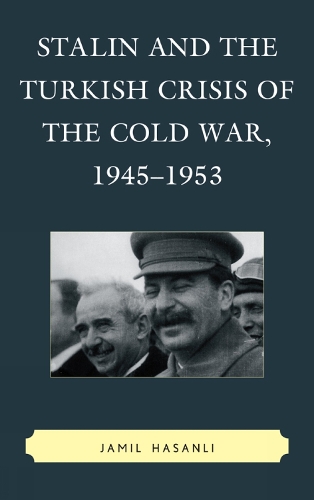
Stalin and the Turkish Crisis of the Cold War, 19451953
(Hardback)
Available Formats
Publishing Details
Stalin and the Turkish Crisis of the Cold War, 19451953
By (Author) Jamil Hasanli
Bloomsbury Publishing PLC
Lexington Books
14th October 2011
United States
Classifications
General
Non Fiction
European history
International relations
327.47056109044
Physical Properties
Hardback
438
Width 162mm, Height 239mm, Spine 32mm
807g
Description
This book presents the ups and downs of the Soviet-Turkish relations during World War II and immediately after it. Hasanli draws on declassified archive documents from the United States, Russia, Armenia, Georgia, Turkey, and Azerbaijan to recreate a true picture of the time when the 'Turkish crisis' of the Cold War broke out. It explains why and how the friendly relations between the USSR and Turkey escalated into enmity, led to the increased confrontation between these two countries, and ended up with Turkey's entry into NATO. Hasanli uses recently-released Soviet archive documents to shed light on some dark points of the Cold War era and the relations between the Soviets and the West. Apart from bringing in an original point of view regarding starting of the Cold War, the book reveals some secret sides of the Soviet domestic and foreign policies. The book convincingly demonstrates how Soviet political technologists led by Josef Stalin distorted the picture of a friendly and peaceful country_Turkey_into the image of an enemy in the minds of millions of Soviet citizens.
Reviews
Jamil Hasanli has once again broken significant historical ground with this fascinating new study. Based on an extraordinary array of archival sources Turkish, Russian, Azeri, Armenian, Georgian, U.S., and West European he explores with fresh perspective a crucial early chapter of the Cold War, and in the process provides insights into some of the most controversial issues that still plague the region to this day. -- Malcolm Byrne, research director, the National Security Archive at George Washington University
With a treasure-trove of archival sources from Moscow and Baku, this book documents Stalins plot to gain access to the Mediterranean. Dr. Hasanlis superb research follows the impressive range of developments, from the Big Three diplomacy to the complexity of regional nationalist aspirations. -- Vladislav Zubok, London School of Economics and Political Science
An important new study of the origins of the cold war that challenges Eurocentric interpretations. Based on a wealth of material from Soviet, Western and Turkish archives, Hasanli argues that Stalins ambitions in the Near East were central to the postwar breakup of the Grand Alliance. Right or wrong, Hasanli has written a book that commands the attention of all students and scholars of the early cold war. -- Geoffrey Roberts, University College Cork
Author Bio
Jamil Hasanli is professor of history at Baku State University.
